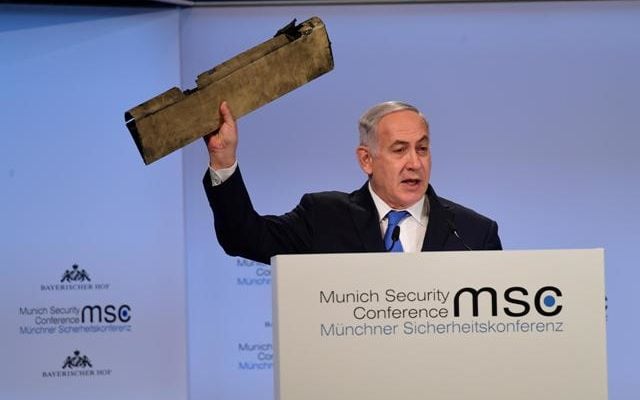Then, like now, what starts with the Jews does not end with the Jews.
By: Daniel Krygier, Political Analyst, World Israel News
In 1938, the leaders of France and Britain appeased Nazi German leader Adolf Hitler in Munich by allowing him to annex parts of Czechoslovakia. Britain’s former Prime Minister Neville Chamberlain infamously announced “peace in our time.” A year later, the devastating Second World War broke out with Nazi Germany’s invasion of Poland.
Eighty years later, Israeli Prime Minister Benjamin Netanyahu recently warned international leaders in Munich of Iran’s aggressive regime as a threat to world peace. In fact, Netanyahu has vocally warned about the Iranian threat for years before the Western powers, Russia and China signed the nuclear deal with the Ayatollah regime in 2015. Like Nazi Germany, Iran’s Islamist regime is driven by an imperialist supremacist ideology and an obsessive genocidal hatred of the Jewish people. Unlike Hitler, the Iranian regime has, until recently, carefully tried to mask its aggression by letting proxies like Hezbollah do its dirty work.
Merely days before the recent Munich Security Conference, a sophisticated Iranian drone, deployed from Syria, succeeded in entering Israeli air space before being shot down by the IDF. Holding a piece of the destroyed Iranian drone in Munich, Netanyahu warned Iran not to test Israel’s resolve. In the most serious military confrontation between Israel and Iran in Syria to date, Israel lost its first warplane since 1982. Israel responded by bombing a dozen Iranian and Syrian targets and destroying much of Syria’s air defenses.
Before becoming Britain’s Prime Minister, Winston Churchill had been a lone voice, warning the free world of the dangers of appeasing Hitler. Before the Second World War, Churchill was ridiculed at home and abroad, and the Nazi menace was largely dismissed. Today, the Iranian threat is dismissed by much of the free world, which is bent on keeping the nuclear deal with Tehran seemingly at almost any price. Just as Hitler was once considered a “Jewish problem,” Iran’s genocidal regime is considered by many to be an “Israeli problem.”
Then, like now, what starts with the Jews does not end with the Jews. Like Nazi Germany, the Iranian Islamist regime’s aggressive ambitions extend far beyond the Jews. Many of Israel’s Sunni Arab neighbors feel so threatened by Iran that they even cultivated tacit cooperation with the Jewish state.
During eight years of the hostile Obama administration, Netanyahu was the free world’s leading voice against the Iranian menace, which much of the West pretends does not exist. Western appeasement paved the way to the Second World War. Today, Western appeasement emboldens Iran’s regime to escalate its aggression.
Unlike Czechoslovakia, Israel is powerful and capable of confronting the Iranian threat. Whether a full-scale war with Iran can be averted largely depends on Russia and the United States. President Donald Trump can reduce the threat of war with Iran by abandoning Obama’s appeasement, restoring credible American military deterrence and increasing the pressure on the Iranian regime.





